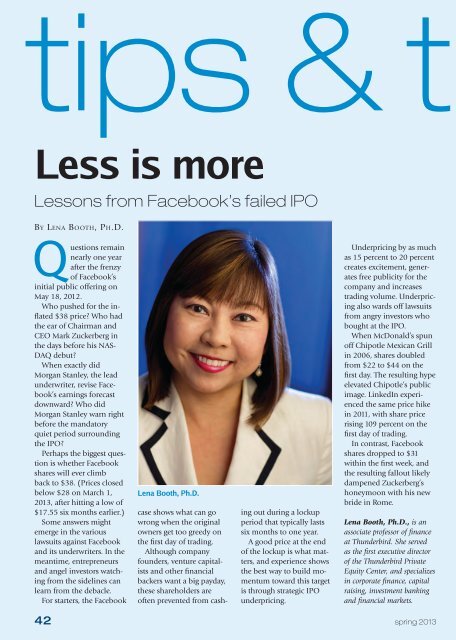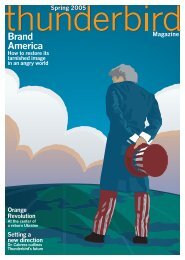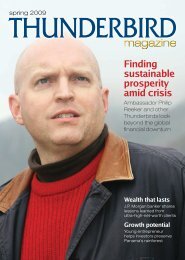Current Issue - Thunderbird Magazine - Thunderbird School of ...
Current Issue - Thunderbird Magazine - Thunderbird School of ...
Current Issue - Thunderbird Magazine - Thunderbird School of ...
You also want an ePaper? Increase the reach of your titles
YUMPU automatically turns print PDFs into web optimized ePapers that Google loves.
tips & t<br />
Less is more<br />
Lessons from Facebook’s failed IPO<br />
QBY LENA BOOTH, PH.D.<br />
uestions remain<br />
nearly one year<br />
after the frenzy<br />
<strong>of</strong> Facebook’s<br />
initial public <strong>of</strong>fering on<br />
May 18, 2012.<br />
Who pushed for the inflated<br />
$38 price? Who had<br />
the ear <strong>of</strong> Chairman and<br />
CEO Mark Zuckerberg in<br />
the days before his NAS-<br />
DAQ debut?<br />
When exactly did<br />
Morgan Stanley, the lead<br />
underwriter, revise Facebook’s<br />
earnings forecast<br />
downward? Who did<br />
Morgan Stanley warn right<br />
before the mandatory<br />
quiet period surrounding<br />
the IPO?<br />
Perhaps the biggest question<br />
is whether Facebook<br />
shares will ever climb<br />
back to $38. (Prices closed<br />
below $28 on March 1,<br />
2013, after hitting a low <strong>of</strong><br />
$17.55 six months earlier.)<br />
Some answers might<br />
emerge in the various<br />
lawsuits against Facebook<br />
and its underwriters. In the<br />
meantime, entrepreneurs<br />
and angel investors watching<br />
from the sidelines can<br />
learn from the debacle.<br />
For starters, the Facebook<br />
Lena Booth, Ph.D.<br />
case shows what can go<br />
wrong when the original<br />
owners get too greedy on<br />
the first day <strong>of</strong> trading.<br />
Although company<br />
founders, venture capitalists<br />
and other financial<br />
backers want a big payday,<br />
these shareholders are<br />
<strong>of</strong>ten prevented from cashing<br />
out during a lockup<br />
period that typically lasts<br />
six months to one year.<br />
A good price at the end<br />
<strong>of</strong> the lockup is what matters,<br />
and experience shows<br />
the best way to build momentum<br />
toward this target<br />
is through strategic IPO<br />
underpricing.<br />
Underpricing by as much<br />
as 15 percent to 20 percent<br />
creates excitement, generates<br />
free publicity for the<br />
company and increases<br />
trading volume. Underpricing<br />
also wards <strong>of</strong>f lawsuits<br />
from angry investors who<br />
bought at the IPO.<br />
When McDonald’s spun<br />
<strong>of</strong>f Chipotle Mexican Grill<br />
in 2006, shares doubled<br />
from $22 to $44 on the<br />
first day. The resulting hype<br />
elevated Chipotle’s public<br />
image. LinkedIn experienced<br />
the same price hike<br />
in 2011, with share price<br />
rising 109 percent on the<br />
first day <strong>of</strong> trading.<br />
In contrast, Facebook<br />
shares dropped to $31<br />
within the first week, and<br />
the resulting fallout likely<br />
dampened Zuckerberg’s<br />
honeymoon with his new<br />
bride in Rome.<br />
Lena Booth, Ph.D., is an<br />
associate pr<strong>of</strong>essor <strong>of</strong> finance<br />
at <strong>Thunderbird</strong>. She served<br />
as the first executive director<br />
<strong>of</strong> the <strong>Thunderbird</strong> Private<br />
Equity Center, and specializes<br />
in corporate finance, capital<br />
raising, investment banking<br />
and financial markets.<br />
42 spring 2013
















